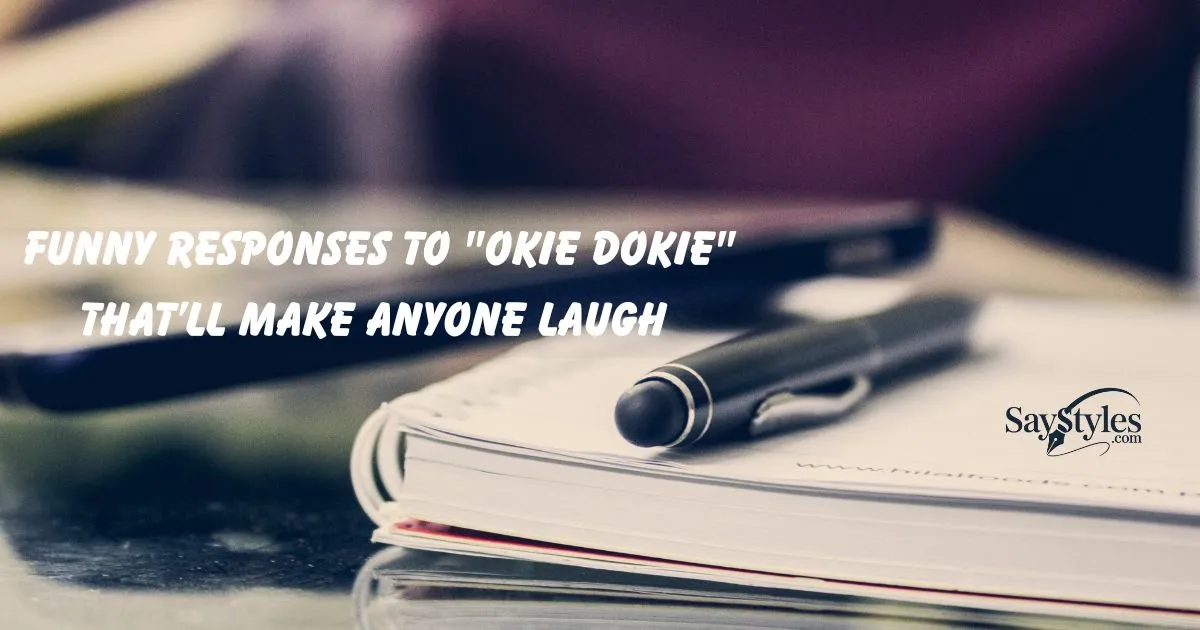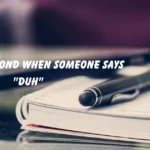“When someone hits you with an ‘Okie Dokie’, it’s the perfect moment to hit back with humor.” That’s something I’ve learned the fun way, and today I’m excited to share it with you.
Hi there! I’m the kind of person who can’t just say “okay” and move on. If someone drops an “Okie Dokie” in a chat or conversation, my brain immediately starts cooking up a funny comeback. Because why not keep things light and make people smile?
This topic is for anyone who loves adding a little fun to everyday talks. You don’t have to be a comedian, just someone who enjoys playful replies. And don’t worry, all the ideas here are super easy to understand. When you’re in school, at work, or just chatting with friends, you’ll find something that fits your style.
In this article, you’ll get a bunch of funny, clever, and unique responses to ‘Okie Dokie’ that’ll turn any normal conversation into a laugh-out-loud moment.
What “Okie Dokie” Really Means
When someone says “Okie Dokie”, they are giving a casual, friendly, or playful agreement or acknowledgment. This phrase is common in texts, casual conversations, and lighthearted interactions and signals acceptance, compliance, or relaxed affirmation in a cheerful or informal tone.
List of Responses to “Okie Dokie” That’ll Make Anyone Laugh
- Okie dokie, artichokie!
- Roger that, Captain!
- Cool beans, let’s roll!
- Sounds like a plan, Stan!
- Okie dokie, smokie!
- Sure thing, buttercup!
- You got it, cupcake!
- Right-o, maestro!
- All set, superstar!
- You betcha, sunshine!
- Sure thing, jellybean!
- Affirmative, commander!
- Indeed, captain!
- Right on, buddy!
- You got it, champ!
- Okay-dokey, pokey!
- Gotcha, good buddy!
- Alrighty then!
- You bet, chief!
- No problemo, amigo!
- Sure thing, pal!
- Roger that, partner!
- You got it, tiger!
- All good, buddy!
- You betcha, amigo!
- Right on, buddy!
- A-okay, partner!
- Absolutely, pal!
- Copy that, chief!
- Okay-doke, dude!
- Copy that, chief!
- Okay-doke, dude!
- Right on, buddy!
- Affirmative, commander!
- Alrighty then!
Okie dokie, artichokie!
Story: Sarah and Mike agreed to meet for lunch, and Sarah confirmed with a fun twist.
When to Use: Use this when you want to keep things light and playful in casual conversations.
When Not to Use: Avoid this in formal or professional settings.
Example:
Mike: Can we meet at noon?
Sarah: Okie dokie, artichokie!
How to Respond 🗣️:
Mike: Haha, love it! See you then.
Roger that, Captain!
Story: During a team project, Alex confirms instructions from Jamie with military-style humor.
When to Use: Use this when confirming instructions, especially with close colleagues or friends.
When Not to Use: Avoid in serious or highly formal environments.
Example:
Jamie: Please send me the draft by 5 PM.
Alex: Roger that, Captain!
How to Respond 🗣️:
Jamie: Perfect, thanks Alex!
Cool beans, let’s roll!
Story: When planning a weekend trip, Emma agrees enthusiastically with Noah’s suggestion.
When to Use: Use this when excitedly agreeing to a fun plan or idea.
When Not to Use: Don’t use this for serious or professional agreements.
Example:
Noah: Road trip this weekend?
Emma: Cool beans, let’s roll!
How to Respond 🗣️:
Noah: Can’t wait!
Sounds like a plan, Stan!
Story: Lily agrees to her friend Stan’s idea for dinner plans.
When to Use: Use this when affirming a plan with a rhyme for a friendly tone.
When Not to Use: Avoid when talking to strangers or in formal contexts.
Example:
Stan: Pizza at 7?
Lily: Sounds like a plan, Stan!
How to Respond 🗣️:
Stan: Great, see you there!
Okie dokie, smokie!
Story: Jake confirms his sister Zoe’s request to pick him up after work with a playful phrase.
When to Use: Use when agreeing in a lighthearted and informal way.
When Not to Use: Don’t use in business or official communications.
Example:
Zoe: Can you grab me after work?
Jake: Okie dokie, smokie!
How to Respond 🗣️:
Zoe: Thanks, you’re the best!
Sure thing, buttercup!
Story: Mia agrees to help her friend Ben with a project using a sweet nickname.
When to Use: Use when offering help or agreeing with friends or loved ones.
When Not to Use: Avoid with people who may find nicknames unprofessional or uncomfortable.
Example:
Ben: Can you help me with this?
Mia: Sure thing, buttercup!
How to Respond 🗣️:
Ben: You’re awesome, thanks!
You got it, cupcake!
Story: Tom agrees enthusiastically to his partner Lily’s suggestion for date night.
When to Use: Use when you want to sound affectionate and casual.
When Not to Use: Don’t use with strangers or in work settings.
Example:
Lily: Movie night tomorrow?
Tom: You got it, cupcake!
How to Respond 🗣️:
Lily: Can’t wait!
Right-o, maestro!
Story: Emma confirms instructions from her colleague Liam in a fun, respectful way.
When to Use: Use this phrase when agreeing with someone you respect in a lighthearted way.
When Not to Use: Avoid in very formal or serious business meetings.
Example:
Liam: Can you finalize the report today?
Emma: Right-o, maestro!
How to Respond 🗣️:
Liam: Thanks, Emma!
All set, superstar!
Story: After finishing preparations, Noah reassures friend Ava that everything is ready.
When to Use: Use this when letting someone know you’re ready with enthusiasm.
When Not to Use: Avoid in formal or serious conversations.
Example:
Ava: Are you ready to leave?
Noah: All set, superstar!
How to Respond 🗣️:
Ava: Let’s go then!
You betcha, sunshine!
Story: During a casual chat, Zoe confirms her agreement to Max’s plan with warmth.
When to Use: Use when you want to show friendliness and agreement.
When Not to Use: Avoid this in professional or formal settings.
Example:
Max: Want to join us for coffee?
Zoe: You betcha, sunshine!
How to Respond 🗣️:
Max: Awesome, see you there!
Sure thing, jellybean!
Story: During a friendly chat, Jack agrees to help his friend Emily with her homework in a cute way.
When to Use: Use when accepting a favor or request from someone you are close with.
When Not to Use: Avoid in serious or professional conversations.
Example:
Emily: Can you explain this math problem?
Jack: Sure thing, jellybean!
How to Respond 🗣️:
Emily: Thanks a ton, Jack!
Affirmative, commander!
Story: Sam confirms instructions from his team leader Jessica during a group project.
When to Use: Use when you want to sound official but still casual with close teammates.
When Not to Use: Avoid in very formal or highly sensitive situations.
Example:
Jessica: Please send the slides by noon.
Sam: Affirmative, commander!
How to Respond 🗣️:
Jessica: Great, thanks Sam!
Indeed, captain!
Story: Lisa agrees enthusiastically with her friend Mark’s plan for the weekend.
When to Use: Use when confirming plans or ideas with a playful tone.
When Not to Use: Avoid in professional or unfamiliar company.
Example:
Mark: Let’s hit the beach on Saturday?
Lisa: Indeed, captain!
How to Respond 🗣️:
Mark: Awesome, looking forward to it!
Right on, buddy!
Story: Chris agrees to his friend Alex’s suggestion during a casual hangout.
When to Use: Use when you want to show casual agreement with friends or colleagues.
When Not to Use: Avoid with people you don’t know well or in formal talks.
Example:
Alex: Want to grab some lunch?
Chris: Right on, buddy!
How to Respond 🗣️:
Alex: Let’s go!
You got it, champ!
Story: During a sports practice, coach Danny agrees with player Ryan’s request.
When to Use: Use when encouraging or agreeing with someone in a positive way.
When Not to Use: Avoid with people who prefer formal communication.
Example:
Ryan: Can I take the lead this game?
Danny: You got it, champ!
How to Respond 🗣️:
Ryan: Thanks, coach!
See also: Funny Replies to “Happy to Help You”
Okay-dokey, pokey!
Story: Mary confirms her plans with friend John in a playful way before heading out.
When to Use: Use when you want to sound fun and easygoing.
When Not to Use: Avoid in professional or serious settings.
Example:
John: Meet at 7?
Mary: Okay-dokey, pokey!
How to Respond 🗣️:
John: Perfect!
Gotcha, good buddy!
Story: Ben confirms his friend Lisa’s instructions while working on a project together responses to okie dokie.
When to Use: Use when agreeing with someone in a friendly, informal way.
When Not to Use: Avoid with strangers or in formal communication.
Example:
Lisa: Don’t forget to send the email.
Ben: Gotcha, good buddy!
How to Respond 🗣️:
Lisa: Thanks, Ben!
Alrighty then!
Story: After agreeing to a last-minute plan, Kate replies quickly and cheerfully to James responses to okie dokie.
When to Use: Use when you want to agree casually and enthusiastically.
When Not to Use: Avoid in very formal or business situations.
Example:
James: Can you join us for dinner?
Kate: Alrighty then!
How to Respond 🗣️:
James: Great, see you there!
You bet, chief!
Story: Tom agrees enthusiastically with his coworker Rachel on a task deadline responses to okie dokie.
When to Use: Use when you want to show confident agreement in an informal workplace setting.
When Not to Use: Avoid in highly formal corporate communications.
Example:
Rachel: Can you finish that by Friday?
Tom: You bet, chief!
How to Respond 🗣️:
Rachel: Thanks, Tom!
No problemo, amigo!
Story: Carlos agrees to help his friend Maria move on the weekend with a friendly tone.
When to Use: Use when accepting a favor or agreeing to help informally.
When Not to Use: Avoid in professional or formal conversations.
Example:
Maria: Can you help me move on Saturday?
Carlos: No problemo, amigo!
How to Respond 🗣️:
Maria: Thanks, you’re a lifesaver!
Sure thing, pal!
Story: Jake agrees to meet his friend Olivia for coffee after work.
When to Use: Use when you want to show friendly agreement with someone you know well.
When Not to Use: Avoid in formal or professional conversations.
Example:
Olivia: Coffee at 5?
Jake: Sure thing, pal!
How to Respond 🗣️:
Olivia: Awesome, see you then!
Roger that, partner!
Story: During a group task, Amy confirms with her teammate Mark using a friendly tone.
When to Use: Use when you want to confirm understanding with someone you work closely with.
When Not to Use: Avoid in formal or serious settings.
Example:
Mark: I’ll handle the presentation slides.
Amy: Roger that, partner!
How to Respond 🗣️:
Mark: Thanks, Amy!
You got it, tiger!
Story: Kelly encourages her younger brother Jason before his big game.
When to Use: Use when affirming or encouraging someone with affection.
When Not to Use: Avoid in professional or formal conversations.
Example:
Jason: I’m nervous about the game.
Kelly: You got it, tiger!
How to Respond 🗣️:
Jason: Thanks, sis!
All good, buddy!
Story: Liam assures his friend Hannah everything is ready for the party.
When to Use: Use when confirming readiness or agreement in casual talks.
When Not to Use: Avoid in official or serious contexts.
Example:
Hannah: Is the music set?
Liam: All good, buddy!
How to Respond 🗣️:
Hannah: Perfect!
You betcha, amigo!
Story: Carlos confirms plans with his friend Diego for a weekend outing.
When to Use: Use when enthusiastically agreeing with friends in informal settings.
When Not to Use: Avoid in professional or formal conversations.
Example:
Diego: Ready for the hike?
Carlos: You betcha, amigo!
How to Respond 🗣️:
Diego: Let’s do it!
Right on, buddy!
Story: Sam agrees with his friend Jess about going to the movies.
When to Use: Use when you want to show casual agreement.
When Not to Use: Avoid in serious or formal conversations.
Example:
Jess: Movie night tonight?
Sam: Right on, buddy!
How to Respond 🗣️:
Jess: See you there!
A-okay, partner!
Story: During a work project, Nora confirms details with her coworker Dave.
When to Use: Use when you want to sound upbeat but professional among colleagues.
When Not to Use: Avoid in highly formal meetings.
Example:
Dave: Will you send the report today?
Nora: A-okay, partner!
How to Respond 🗣️:
Dave: Thanks, Nora!
Absolutely, pal!
Story: Tom agrees to help his friend with moving furniture responses to okie dokie.
When to Use: Use when you want to sound warm and supportive.
When Not to Use: Avoid in formal or business contexts.
Example:
Friend: Can you help me on Saturday?
Tom: Absolutely, pal!
How to Respond 🗣️:
Friend: Thanks, Tom!
Copy that, chief!
Story: Jill acknowledges her manager’s instruction during a meeting.
When to Use: Use when confirming orders or tasks in a casual but respectful tone.
When Not to Use: Avoid in highly formal or serious situations.
Example:
Manager: Please update the client on the project status.
Jill: Copy that, chief!
How to Respond 🗣️:
Manager: Good job, Jill!
Okay-doke, dude!
Story: Matt agrees to hang out with his friend Kevin after work responses to okie dokie.
When to Use: Use when you want to keep things casual and friendly.
When Not to Use: Avoid in formal or professional communication.
Example:
Kevin: Want to catch a game later?
Matt: Okay-doke, dude!
How to Respond 🗣️:
Kevin: Awesome, see you then!
Copy that, chief!
Story: Emma listens carefully as her manager, Daniel, gives her a task to complete by the end of the day.
When to Use: Use this phrase to show clear understanding and agreement when receiving instructions, especially in casual work conversations.
When Not to Use: Avoid using it in very formal or serious professional settings where more formal language is expected.
Example:
Daniel: Make sure the report is ready by 5 PM.
Emma: Copy that, chief!
How to Respond 🗣️:
Daniel: Thanks, Emma. I trust you’ll handle it well.
Okay-doke, dude!
Story: Ben agrees to join his friend Sarah for a spontaneous road trip after work responses to okie dokie.
When to Use: Use in informal conversations with close friends or peers to express agreement in a fun way.
When Not to Use: Avoid in formal or professional environments where casual slang may seem unprofessional.
Example:
Sarah: Ready to hit the road?
Ben: Okay-doke, dude!
How to Respond 🗣️:
Sarah: Let’s go then!
Right on, buddy!
Story: Jake encourages his friend Mike when they decide to start a new hobby together responses to okie dokie.
When to Use: Use this phrase to show enthusiasm and support when agreeing with a friend or colleague.
When Not to Use: Avoid in formal or official conversations as it’s too casual.
Example:
Mike: Let’s try rock climbing this weekend.
Jake: Right on, buddy!
How to Respond 🗣️:
Mike: Can’t wait!
Affirmative, commander!
Story: Rachel responds to her team leader Mark during a team project meeting responses to okie dokie.
When to Use: Use this phrase playfully to show you understood and accepted a task or order, especially in casual team settings.
When Not to Use: Avoid in serious or highly formal meetings where it might sound too informal or sarcastic.
Example:
Mark: Make sure the client gets the proposal by Friday.
Rachel: Affirmative, commander!
How to Respond 🗣️:
Mark: Thanks for the quick response!
Alrighty then!
Story: Laura agrees to her friend Tom’s suggestion to try a new restaurant for dinner.
When to Use: Use this phrase in informal chats to say yes or agree in a cheerful, casual way.
When Not to Use: Avoid in professional or formal conversations where it may sound too relaxed.
Example:
Tom: How about sushi tonight?
Laura: Alrighty then!
How to Respond 🗣️:
Tom: Perfect, let’s book a table!
How These Clever Responses Actually Work
Clever responses to “Okie Dokie” work by matching the casual tone, playfulness, or enthusiasm. Effective replies can be friendly, witty, or equally informal, depending on context.
Using terms like playful acknowledgment, cheerful reply, friendly response, and engaging comment ensures the interaction feels lighthearted, socially smooth, and memorable without overcomplicating the conversation.
Top 15 Editor’s Choice Responses
- “Okie dokie, artichokie!” – A playful way to say yes with a fun rhyme.
- “Roger that, Captain!” – Confident and casual agreement.
- “Cool beans, let’s roll!” – Energetic and friendly confirmation.
- “Sounds like a plan, Stan!” – Lighthearted way to agree on a plan.
- “Sure thing, buttercup!” – Sweet and informal way to say yes.
- “You got it, cupcake!” – Warm, encouraging acceptance.
- “Right-o, maestro!” – Playful and respectful affirmation.
- “All set, superstar!” – Positive and motivating agreement.
- “You betcha, sunshine!” – Cheerful and upbeat yes.
- “No problemo, amigo!” – Casual, friendly “no problem.”
- “Sure thing, pal!” – Friendly and simple agreement.
- “Roger that, partner!” – Casual confirmation with a buddy feel.
- “You got it, tiger!” – Supportive and encouraging yes.
- “All good, buddy!” – Relaxed and positive agreement.
- “Absolutely, pal!” – Warm and confident affirmation.
Conclusion
Using fun and friendly responses to okie dokie like these adds a light, positive vibe to everyday conversations. When you’re confirming plans, showing agreement, or simply keeping things casual, phrases like “Copy that, chief!” or “Alrighty then!” help make communication feel warm and approachable.
Remember to choose your words based on the situation and the people you’re talking to keeping it casual with friends and more formal when needed. These expressions not only show your agreement but also help build connection and ease in conversations. So, next time someone asks for your okay, try one of these playful replies to keep the mood upbeat and engaging!

I’m Lily Hart, the Admin behind the engaging responses at SayStyles.com! With a knack for blending wit and warmth, I turn every piece of writing into something memorable. From clever advice to fun comebacks, I’m here to make sure every response leaves you smiling and thinking.






